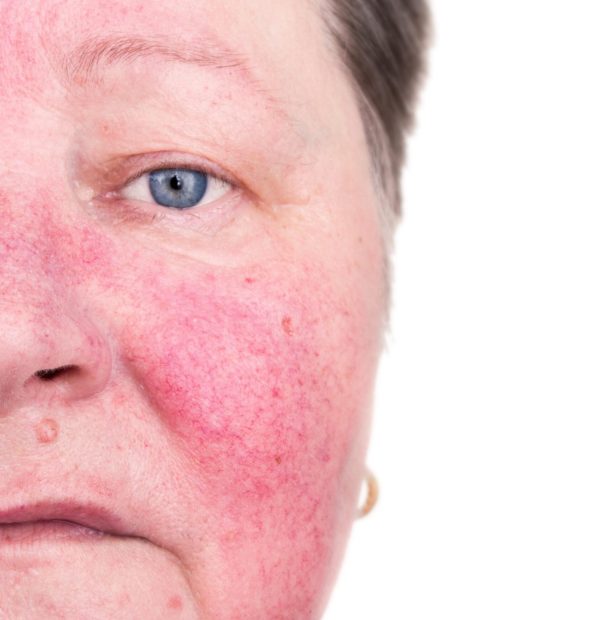Medrose Medical Center | Barsha Heights, Tecom
Rosacea is a chronic inflammatory skin condition that primarily affects the face. It is characterized by redness, flushing, visible blood vessels, and the development of papules and pustules.
Although the exact cause of rosacea is still unknown, various factors, including genetic predisposition, environmental triggers, and an abnormal immune response, are believed to contribute to its development.
Genetics
Individuals with a family history of rosacea are more likely to develop the condition.
Abnormal Immune Response
Dysfunction of the immune system, particularly the innate immune system, may play a role in the development of rosacea.
Demodex Mites
These microscopic mites that reside on the skin may contribute to the development of rosacea by triggering an immune response.
Environmental Triggers
Certain triggers, such as sun exposure, hot weather, spicy foods, alcohol, and emotional stress, can exacerbate rosacea symptoms.

Symptoms of Rosacea
The symptoms of rosacea can vary from mild to severe and may include:
- Facial redness: Persistent redness, particularly in the central face area, often resembling a flushed or sunburned appearance.
- Visible Blood Vessels: Small, visible blood vessels (telangiectasia) may appear on the nose, cheeks, forehead, and chin.
- Papules and Pustules: Inflammatory bumps like acne may develop, with or without the presence of pus-filled lesions.
- Ocular Symptoms: Some individuals with rosacea may experience eye symptoms, such as dryness, redness, irritation, and sensitivity to light.
Treatment Options for Rosacea:
While there is no cure for rosacea, various treatment options can help manage its symptoms and prevent flare-ups. The choice of treatment depends on the severity and specific symptoms experienced by everyone. Common treatment options include:
- Topical Medications: Prescription creams, gels, or lotions containing metronidazole, azelaic acid, or other topical antibiotics can help reduce inflammation and control papules and pustules.
- Oral Medications: In cases of moderate to severe rosacea, oral antibiotics such as tetracycline, doxycycline, or isotretinoin may be prescribed to reduce inflammation and control symptoms.
- Laser and Light Therapies: Certain laser and light-based treatments, such as intense pulsed light (IPL) therapy or vascular lasers, can effectively target and reduce redness and visible blood vessels associated with rosacea.
- Skincare and Lifestyle Modifications: Gentle skincare routines, avoiding triggers, using sunscreen, and managing stress can help minimize symptoms and prevent flare-ups.
- Ocular Management: In cases of ocular rosacea, eye drops or ointments prescribed by an ophthalmologist can help relieve dryness and inflammation.
Consulting a dermatologist for an accurate diagnosis and individualized treatment plan is essential for effectively managing rosacea and improving the quality of life for those affected.
Looking for effective rosacea treatment in Al Barsha Heights, Tecom, Dubai?
Contact us at 055-263-3890 to schedule your consultation and discover our specialized rosacea treatments. Let us help you find the right solution to manage symptoms and achieve clearer, healthier skin.

